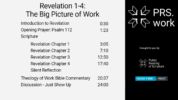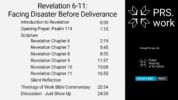All Sessions
Genesis Chapters 1-2: God's Intention for Work (26 minutes)
From the beginning God intended human beings to be his junior partners in the work of bringing creation to fulfillment. We are created to work in relationships, relying on God's provision, and respecting God's limits.
Genesis Chapters 3-5: People Fall into Sin at Work (28 minutes)
We live in a fallen, broken world and we cannot expect life without toil. Nonetheless, God continues to provide for us, and work today is not less important to God’s plan, but more.
Genesis Chapters 6-8: Rebuilding the World With God (24 minutes)
God is always at work to restore what was lost in the Fall. In doing so, God uses humanity as his chief instrument. By partnering in God’s work of restoration, we become active participants in our own redemption.
Genesis Chapters 9-11: When Ambition Becomes Tyranny (25 minutes)
The events of the Tower of Babel suggest that we can't hoard power on our own. When we have power at work, God calls us to disperse, delegate, authorize, and train others.
Genesis Chapters 12-14: Godly Entrepreneurs Look Different (27 minutes)
Abraham provides an example for Godly entrepreneurs. He trusted God and depended every day on God’s guidance and provision. Through him we see that Godly work is willing to depend on God’s guidance and authority and desires to grow widely as a blessing to all the world.
Genesis Chapters 15-18: The Rewards of Hospitality (26 mins)
The story of three travelers who visited Abraham and Sarah in Genesis 18 demonstrates what generous hospitality looked like in the ancient world, and what we can do to practice hospitality in our work today.
Genesis Chapters 21-23: Godly Negotiation (25 minutes)
Abraham demonstrates godly negotiation twice in Genesis chapters 21-23. In both cases all parties came away with a clear understanding of what belongs to whom, and with good working relationships that benefit everyone involved.
Genesis Chapters 25-27: When Power Blinds Us to Our Own Biases (31 minutes)
Isaac’s life shows that when it comes to handing down power and fulfilling God’s purposes, both individuals and organizations need to put the truly important ahead of personal preference.
Genesis Chapters 27-30: Wealth Without Ethics (35 minutes)
Jacob’s relentless drive to gain benefits for himself at the expense of others reveals how our fears can make us resistant to God’s transforming grace. Wealth without ethics, while enticing, is not the whole story of God’s blessing.
Genesis Chapters 31-33: Making Things Right After Ethical Failure (29 minutes)
Jacob models for us a truth at the core of our faith: our relationships with God and people are linked. Our reconciliation with God makes possible reconciliation with others. Likewise, in human reconciliation, we come to see and know God better.
Genesis Chapters 37-39: When Others Squash Our Dreams (21 minutes)
No matter what we face at work, we can trust that we belong to the Lord and that he defends the weak.
Genesis Chapters 37-39: When Others Squash Our Dreams (27 minutes)
No matter what we face at work, we can trust that we belong to the Lord and that he defends the weak. When we truly believe this promise, there is no injustice or difficult situation that can completely squash our dreams.
Genesis Chapters 40-42: Should You Invest in Someone Else's Success? (28 minutes)
We may invest in the success of another who rises beyond our reach, only to be discarded when our usefulness has been spent. Does this mean that our work has been for nothing? The story of Joseph while a prisoner in Egypt offers us insight into just such situations.
Genesis Chapters 45-47: God Can Turn Failure Into Something Good (29 minutes)
Of the many lessons about work in the book of Genesis, this one in particular endures. God is capable of working with our faithfulness, mending our weakness, and forgiving our failures. Through his grace, God is able to accomplish what he himself has prepared for all of us who love him.
Exodus Chapters 1-3: The Harshness of Labor in Egypt (20 minutes)
Israel’s mistreatment by the Egyptians provides the background and impetus for their redemption. In response to their suffering, God does not deliver them into a life of total rest, but a release from oppressive work.
Exodus Chapters 4-6: God's Work of Redemption for Israel (26 minutes)
In response to Moses’ questioning, God clarified the design of his work. What we read here in Exodus 6:2-8 pertains not only to the immediate context of Israel’s oppression in Egypt. It frames an agenda that embraces all of God’s work in the Bible.
Exodus Chapters 7-8: God's Judgment (19 minutes)
Pharaoh refused to listen to God’s demand, through Moses, to release Israel from slavery. In turn, Moses announced God’s judgment to Pharaoh through an increasingly severe series of ecological disasters.
Exodus Chapters 13-14: Parting the Red Sea (20 minutes)
The foundational expression of God’s work came to dramatic fruition when God decisively led his people through the Red Sea, releasing them from Egypt’s tyrannical hold.
Exodus Chapters 18-20: The Meaning of The Law in Exodus (22 minutes)
In Exodus, it is clear that Torah – in the sense of a set of specific instructions – is part of the covenant and not the other way around. The covenant describes the relationship that God has established between himself and his people by virtue of his act of deliverance on their behalf.
Exodus Chapters 22-23: The Role of the Law for Christians (22 minutes)
It can be a challenge for a Christian to draw a point from a verse in the book of Exodus and then suggest how that lesson should be applied today. How are we to know what applies today and what doesn’t? How do we avoid the charge of inconsistency in our handling of the Bible? More importantly, how do we let God’s word truly transform us in every area of life?
Exodus Chapters 25-26: God the Builder (20 minutes)
The building of the Tabernacle crossed multiple categories for the people of Israel. It was not only their place to worship. It was about establishing the presence of God in their midst.
Leviticus Chapters 5-7: Fixing Damage from Financial Abuse (28 minutes)
If we hurt others at work, we must make restitution. The guilt offering in Leviticus reminds us that God's forgiveness is not a replacement for setting things right. For those who have abused others financially, drawing near to God requires a sacrifice.
Ruth Chapters 1-2: God at Work through Hardship (20 minutes)
The book of Ruth tells the extraordinary story of God’s faithfulness to Israel in the life and work of three ordinary people, Naomi, Ruth and Boaz. As they work through both economic hardship and prosperity, we see God’s faithfulness create opportunities for fruitful work. Their faithfulness to God brings the blessing of provision and security to each other and the people around them.
Ruth Chapters 3-4: God Works through Human Ingenuity (17 minutes)
The characters' ingenuity in the book of Ruth moves the story towards its happy conclusion. Boaz, Naomi, and Ruth each display ingenuity that honors God and furthers God’s purposes.
1 Samuel Chapters 1-3: The Calling of Samuel (23 minutes)
Samuel receives one of the few audible calls from God recorded in the Bible. It is interesting to note that Samuel’s call was not a call to a type of work or ministry. Samuel’s audible call from God was to a specific task, namely to tell Eli that God had decided to punish him and his sons. The story of Eli’s sons demonstrates the perils of inherited authority.
1 Samuel Chapters 4-7: The Perils of Treating God Like a Good Luck Charm (27 minutes)
From the closing words of the book of Judges and the opening chapters of 1 Samuel, we know that the Israelites are both leaderless and disconnected from God. The closest thing that they have to a national leader is the priest Eli, who with his sons runs the shrine at Shiloh. The Israelites’ political, military, and economic prosperity depends on their faithfulness to God. So the people bring their offerings and sacrifices to God at the shrine, but the priests make a mockery of their interaction with God.
1 Samuel Chapters 8-9: The Heartbreak of Wayward Children (16 minutes)
There are many institutional and workplace situations where leadership must admit to people's poor choices, yet at the same time try to provide opportunities for growth and grace. In our fallen world, our aspiration is to love God and treat other people as God commands.
1 Samuel Chapters 16-17: How to Choose a Leader (23 minutes)
In God's upside-down kingdom, the last or the overlooked may end up being the best choice. What would it take for us to learn to see our leaders through God’s eyes?
1 Samuel Chapters 24-25: Defusing a Crisis (22 minutes)
In 1 Samuel 24-25, Abigail resolves a life-threatening crisis by dressing a major rebuke in a respectful dialogue. The incident shows that you don’t have to have authority status to be called to exercise influence. It also demonstrates that showing respect, even while making a pointed criticism, provides a model for challenging authority.
2 Samuel Chapters 11-12: Successes and Failures of Leadership (22 minutes)
The Bible regards David as the model king of Israel, and the books of Samuel, Kings, and Chronicles describe his many successes. Yet even David, "a man after God's own heart," abuses his power and acts faithlessly at times.
Ezra Chapters 1-2: Working in Places Hostile to God's Values (16 minutes)
The books of Ezra and Nehemiah depict what it is like for God’s people to work in unwelcoming workplaces, openly hostile to God’s values and plans. Yet along the way they receive surprising help from nonbelievers in the highest positions of civic power. God’s power seems to crop up for his people’s good in surprising places.
Ezra Chapters 3-5: Ezra and Work (18 minutes)
The books of Ezra and Nehemiah use historical events to illustrate the theme of restoration, showing how God once restored his people and how people played a central role in this work of renewal. This encourages us to look at how our work may contribute to implanting God’s kingdom in today’s world.
Ezra Chapters 6-7: God at Work Beyond What Meets the Eye (17 minutes)
The Book of Ezra begins with a decree from King Cyrus of Persia, allowing the Jews to return to Jerusalem to rebuild the temple that had been destroyed by the Babylonians in 587 BC. This decree introduces us to one of the principal themes of Ezra and Nehemiah: the relationship between God’s work and human work.
Ezra Chapters 8-10: Idealism and Practicality Both Work (25 minutes)
Ezra was willing to stake his life on the idea of God’s protection, rather than to ensure protection with human help. Nehemiah sought practical help from human authority, and God granted him success as well. Ezra and Nehemiah show us that human efforts are successful when God is at work in them.
Nehemiah Chapters 1-3: Does Trusting God Mean Turning to Prayer, Taking "Practical" Action, or Both? (20 minutes)
Christians sometimes seem to act as if there were a rigid wall between actively pursuing our own agenda and passively waiting for God to act. This is a false duality. Nehemiah and company’s arduous work warns us that trusting God does not equate with sitting on our hands waiting for magical solutions for our difficulties.
Nehemiah Chapters 4-6: Connecting Lending Practices to the Fear of the Lord (19 minutes)
As it was to Nehemiah, God’s call to today’s workers is to do everything we can for our people. In practice, that means we each owe God the duty of caring for all the people who depend on our work: employers, co-workers, customers, and the public. Nehemiah may not tell us exactly how to handle today’s workplace situations, but he tells us how to orient our minds as we decide. Put people first.
Nehemiah Chapters 7-8: Nehemiah Gives Credit to God (20 minutes)
Nehemiah exercised considerable skill to organize the builders, inspire them to work, and fend off attacks and distractions. Nevertheless he saw all of this as work done with God’s help.
Nehemiah Chapters 12-13: Restoration of Covenant Life (21 minutes)
Sabbath-keeping was central to God’s first covenant people, and their vows were threatened by economic interaction with those who did not honor the Sabbath. In today’s context, we may want to examine whether our current round-the-clock culture of commerce puts us in a similar situation.
Esther Chapters 3-4: Working Within a Fallen System (16 minutes)
Esther comes to understand that her high position is not just a privilege to be enjoyed, but a high responsibility to be used to save others.
Job Chapters 23-28: Suffering and Hardship at Work (25 minutes)
The cause of Job's suffering is a mystery. Indeed, it may be the greatest mystery of faith. Why does God allow people he loves to suffer?
Proverbs Chapters 1-5: The Wisdom of Proverbs (25 minutes)
The book of Proverbs tells us that the wisdom we gain is not just for ourselves, but also to share with others. We share wisdom not only by teaching, but also by wise living, imparting wisdom to those who see us and follow our example.
Proverbs Chapters 10-13: The Wise Worker is Diligent (23 minutes)
In an agrarian economy, the connection between hard work and well-being is easy to see. As long as they have access to land to cultivate, hard-working farmers do much better than lazy ones. The proverbs are clear that a lazy worker will lose out in the end.
Proverbs Chapters 14-16: The Wise Worker is Just (22 minutes)
God is just. God desires that the poor be cared for and poverty be eliminated. If we truly love God, then we will care for those whom God loves. Therefore, to relieve the poor and to work to eliminate poverty are matters of justice.
Proverbs Chapters 20-23: The Wise Worker is Shrewd (25 minutes)
A shrewd person acts to improve her skill set or knowledge. The work you are prepared for today is not likely to be the work you will be doing 10 years from now. A shrewd worker recognizes this and retrains for the next opportunity in the workplace. The highest-performing individuals, organizations and societies will be those who develop effective systems for lifelong learning.
Proverbs Chapters 24-27: The Wise Worker Guards the Tongue (25 minutes)
There are more proverbs about the tongue than about any other topic. Communication in some form is an integral part of nearly every job. In addition, social talk at work can improve working relationships, or damage them.
Proverbs Chapters 28-31: The Wise Worker is Trustworthy (27 minutes)
Trustworthiness is the foundation of wisdom and virtue. God created people to work in concert with each other, and without trust this is not possible.
Proverbs Chapters 29-31: Reflecting God's Character at Work
Proverbs 31 describes wisdom personified as the "valiant woman." The valiant woman functions as an affirmation of the dignity of every person’s work.
Ecclesiastes Chapters 1-4: The Search for Meaning at Work (25 minutes)
Having declared his theme that toil is vanity in Ecclesiastes 1:1-11, the Teacher nonetheless proceeds to explore various possibilities for trying to live life well. He considers, among other things, achievement, pleasure, wealth, and finding joy in God’s gifts. In some of these he does find a certain value, yet nothing seems permanent, and the characteristic conclusion in each section is that work comes to a chasing after wind.
Song of Songs Chapters 1-5: Work and Life in Balance (22 minutes)
Work is an essential element of family life. Yet work must always serve — and never crowd out — the most fundamental element of a marriage: love.
Isaiah Chapters 1-4: Work as Worship (25 minutes)
The Prophet Isaiah received a vision of God — of his great power, his glorious majesty, and his purifying holiness. When we glimpse who God is in Scripture, it can cleanse away our inflated self-importance and the insufficiency of our lip-service in worship. But it also can give us a clear picture of what is truly valuable in this life.
Isaiah Chapters 42-43: Be a Servant at Work (22 minutes)
As servants of the Servant of the Lord, we may not receive the acclaim we desire. Rewards may be deferred. But we know that God is our Judge. Isaiah put it this way: “For thus says the high and lofty one who inhabits eternity, whose name is Holy: I dwell in the high and holy place, and also with those who are contrite and humble in spirit, to revive the spirit of the humble, and to revive the heart of the contrite.” (Isaiah 57:15)
Isaiah Chapters 64-66: Our Hope for a Prosperous Future (25 minutes)
God enjoys the creative roles his people play as they endeavor to excel at what they do under God’s covenant. “They shall plant vineyards and eat their fruit!” (Isaiah 65:21). The problems arise when we try to overturn the Creator/creature distinction by replacing God’s values and provision with our own values and unchecked ambition. This happens when we compartmentalize our work as a secular affair that seems to have nothing to do with the kingdom of God.
Jeremiah Chapters 29-31: Bless Society Through Your Work (29 minutes)
In Jeremiah chapter 29, the prophet explains God’s intention for his people’s work. The people Israel should work not only to benefit themselves, but to bless and serve the communities around them.
Daniel Chapters 2-3: Don't Compromise Your Beliefs at Work (28 minutes)
After refusing to worship a statue of Nebuchadnezzar, Daniel's friends Shadrach, Meshach and Abednego expect to be punished, but they stay true to their beliefs anyway. To them being faithful to God was the right thing to do, whether or not it was path to success. In this they are indeed models for us.
Jonah Chapters 1-4: The Purpose of God's Call (21 minutes)
The purpose of a call from God is to serve other people. When God calls Jonah, it is for the benefit of Nineveh. When Jonah rejects God’s guidance, not only do the people he was called to serve languish, but the people surrounding him suffer. If we accept that we are all called to serve God in our work, then we recognize that failing to serve God in our work also diminishes our communities. The more powerful our gifts and talents, the greater the harm we are apt to do if we reject God’s guidance.
Matthew Chapters 1-4: Uncovering the Kingdom of Heaven in Your Workplace (25 minutes)
As Christians, we stand with one foot in the human world, where our work may be subject to ungodly expectations, and at the same time we are subjects of God's kingdom, committed to his values and expectations. In telling the story of Jesus, Matthew shows us how to navigate the human world until God’s Kingdom is fully realized on earth.
Matthew Chapters 5-6: The Beatitudes at Work (26 minutes)
As we step into God’s kingdom in our places of work, we hope to become more like those named as blessed—more meek, more merciful, more hungry for righteousness, more apt to make peace, and so on!
Matthew Chapters 7-9: Jesus' Moral Guidance (28 minutes)
At work, we make snap judgments because we lack the time or inclination to collect true information. Jesus’ Sermon on the Mount tells us that these judgments are not merely an inevitable byproduct of working with others, but an important moral issue.
Matthew Chapters 10-12: Working Under Jesus' Yoke (27 minutes)
Through Jesus' yoke, we feel his pull, his guidance, his direction. Far from being a burden on us, Jesus describes this type of work as restful.
Matthew Chapters 17-19: Conflict Resolution (24 minutes)
Jesus gives us a template for dealing with someone who has wronged us. He lays out a process that begins with seeking one-on-one to be reconciled. Often, attentive listening leads to the discovery of a mutually acceptable resolution. If it doesn’t, then the others with the appropriate skills and authority are asked to get involved.
Matthew Chapters 19-20: Fair Labor Practices (20 minutes)
The parable of the laborers in the vineyard is unique to Matthew’s Gospel. The owner of a vineyard hires day laborers at various times throughout the day, but the owner pays everyone a full day’s wage. It is an example of God's generosity, and a promise that in God's kingdom, we will all find adequate work.
Matthew Chapters 20-22: What's the Greatest Commandment About Work? (27 minutes)
To love a neighbor, as yourself, may require taking risks that loom large when undertaken only for the benefit of someone else and perhaps that is why Jesus joins “love your neighbor as yourself” with “love the Lord” in what is called the “greatest” commandment.
Matthew Chapter 22: What's the Greatest Commandment About Work? (10 minutes)
A short study on what it means to love your neighbor as yourself.
Matthew Chapters 24-25: Using Your Talents (28 minutes)
The meaning of the parable of the talents extends far beyond financial investments. God has given each person a wide variety of gifts, and he expects us to employ those gifts in his service.
Matthew Chapter 26: Using What the World Gives You (23 minutes)
Jesus’ passion is God’s gut-wrenching intervention in the grit and grime of our ragged lives and work. In it, Jesus took the reality of human work – both the good and the harrowing – and not only participated in it, but used it to make something new.
Matthew Chapters 27-28: Work Amidst Death and Resurrection (22 minutes)
The Gospel of Matthew teaches us that the Christian way is to put our entire life, including our work life, at the service of God’s kingdom, which Christ is bringing to earth even now. Christians should rightly be engaged in creating structures that reflect the kingdom of God in all realms of life, the workplace included.
Mark Chapters 1-3: John Baptizes Jesus of Nazareth (22 minutes)
Our origin does not dictate or limit our identity. Through baptism—the visible sign of turning to Jesus’ way—we accept our identity as children of God above and beyond any identity the world confers. The identity that we have as children of God is the starting point by which we live out our lives, even in the workplace.
Mark Chapters 4-6: Jesus the Builder (27 minutes)
How much of the wisdom in Jesus’ parables was developed through his experience as a tradesman in the first-century economy? If nothing else, remembering Jesus’ experience as a builder can help us see the parables in a more concrete light.
Mark Chapters 7-8: Discipleship in Process (19 minutes)
We may feel tempted to portray ourselves as righteous, wise, and skilled in our workplaces, as a witness to Jesus’ righteousness, wisdom, and excellence. But it would be a more honest and more powerful witness to portray ourselves as we really are—fallible and somewhat self-centered works-in-process, evidence of Jesus’ mercy more than demonstrators of his character.
Mark Chapters 9-11: Wealth (27 minutes)
Jesus’ encounter with a rich man who asks “What must I do to inherit eternal life?” constitutes one of the few passages in Mark that speaks directly to economic activity.
Mark Chapters 12-13: Our Work Fulfills the Great Commandment (21 minutes)
When we hold our own actions up to the standard of the Great Commandment, when we love God completely and care for others with the same care we show ourselves, we bring the kingdom of God to our places of work.
Mark Chapters 14-16: The Cross and the Resurrection (30 minutes)
But God’s grace overcomes even the most crushing blows of work and life for those who will accept it. It is the one way our work can yield “a hundredfold now in this age,” and our lives lead into “the age to come, eternal life.”
Luke Chapters 1-2: Jesus' Job Description (25 minutes)
It might seem strange that God introduces Jesus with a job description. But he does, when the angel Gabriel tells Mary she is to give birth to a son. “He will be great and will be called the Son of the Most High."
Luke Chapters 2-4: How Can I Serve God in My Occupation? (26 minutes)
How can you follow God's call in your current job? Luke chapters 2-4 invite us to understand God’s intent for specific work, not only for work in general.
Luke Chapters 3-5: John the Baptist Teaches Workplace Ethics (26 minutes)
Much of Luke consists of Jesus’ teaching. As it happens, the first teaching in Luke is directly about work, although it comes from John the Baptist rather than Jesus.
Luke Chapters 10-11: The Good Samaritan At Work (23 minutes)
Being a Good Samaritan in the workplace means cultivating a specific awareness of the needs of the other. A conscientious Christian is the one who puts time and resources towards these neighbors.
Luke Chapters 14-16: The Parable of the Shrewd Manager (23 minutes)
If God can trust us to spend our money to meet the needs of others, then the money we ourselves need will also be provided. This is the point of the parable of the shrewd manager.
Luke Chapters 18-19: The Parable of the Persistent Widow (21 minutes)
The parable of the persistent widow encourages Christians to persevere in their faith against all odds. But it also shows us that God’s will is at work even in a corrupt world, and that only God can bring about justice in a corrupt world. That is why we must pray and not give up in our work.
Luke Chapters 20-21: Render Unto God What is God's (18 minutes)
Jesus’ saying about taxes has often been used wrongly to separate the world of work from the kingdom of God. The premise that Caesar’s world and God’s world do not overlap makes no sense in light of what Jesus has been saying throughout the Gospel of Luke. What is God’s? Everything!
John Chapters 1-3: In the Beginning Was the Word (22 minutes)
The majestic opening of John’s Gospel which starts with the words “in the beginning” shows the limitless scope of the Word’s work. The Word is the definitive self-expression of God, the one through whom God created all things in the beginning.
John Chapters 4-5: Christ Prepares Our Work (21 minutes)
The story of the woman at the well illustrates someone's inability to move from the everyday work of drawing water to Jesus’ pronouncements on the life-giving power of his word. This motif permeates the Gospel: the crowds repeatedly show an inability to transcend everyday concerns and address the spiritual aspects of life. They do not see how Jesus can offer them his body as bread.
John Chapters 6-7: Jesus the Bread of Life (24 minutes)
John’s telling of the feeding of the five thousand echoes many of the themes we saw in the wedding feast at Cana. Again, Jesus works to sustain life in the present world, even as the sign points toward the ultimate life he alone can offer. John 6:27-29, however, poses a particular challenge for the theology of work.
John Chapters 8-9: Jesus Heals (21 minutes)
In John Chapter 9, Jesus and his disciples see a man born blind. The disciples look on him as a case study on the sources of sin. They wonder who sinned to land the man in this predicament. Jesus looks on the man with compassion and works to remedy his condition.
John Chapters 12-13: Servant Leadership (23 minutes)
When Jesus washes his disciples feet, he sets an example we are meant to follow, so far as we are able. This attitude of humble service should accompany all we do because doing so brings us tangibly face to face with the reality that godly work is performed for the benefit of others.
John Chapter 13: Servant Leadership (6 minutes)
When Jesus washes his disciples feet, he sets an example for all leaders in the workplace.
John Chapters 14-15: The Importance of Workplace Relationships (19 minutes)
Jesus calls the disciples not servants, but friends. They work for Jesus, but in a spirit of friendship and collegiality. It is in the fullest sense of the term a family business.
John Chapters 18-19: Sacrifice for Others (21 minutes)
Jesus’ self-sacrifice would extract many forms of cost. It would cost him his death, of course, but also excruciating pain. It cost him the heartbreak of seeing his disciples (except John) desert him and his mother bereft of him. It cost him the shame of being misunderstood and wrongly blamed. These costs were unavoidable if he was to do the work God set before him.
John Chapters 20-21: Who Did Jesus Love? (17 minutes)
The final chapter of John provides an opportunity to reflect not so much on work itself, but on the identity of the worker. By God’s grace, as we work, we become living parables of the love and glory of God.
Acts Chapters 5-7: The Value of Different Types of Work (31 minutes)
The first intra-group dispute in the early Christian community occurs between the Greek-speaking Jews who have returned to Jerusalem from one of the many Diaspora communities in the Roman Empire, and the Hebrews from the historic land of Israel. It takes very little social imagination to see what is happening in this situation. In a community that sees itself as the fulfillment of Israel’s covenant with God, members who are more prototypically Israelite are receiving more of the group’s resources than the others. This sort of situation happens regularly in our world.
Acts Chapters 9-11: The Work of Tent Making and Christian Calling (29 minutes)
Paul’s identity fundamentally changes when he encounters the risen Jesus on the road to Damascus. When he meets Jesus, Pauls’ world is turned upside down.
Acts Chapters 15-17: Making Decisions as a Group (32 minutes)
Acts 13:1-3 shows the Christian community trying to discern how the Spirit is leading them toward witness. Paul and Barnabas are singled out to work as traveling evangelists and healers. What is remarkable is that this discernment is accomplished communally. The Christian community, rather than the individual, is best able to discern the vocations of its individual members.
Acts Chapters 17-19: Engaging the Culture with Respect (23 minutes)
In the latter half of Acts, Paul, his companions, and various Christian communities come into conflict with those who wield local economic and civic power. After run-ins with the men and women of Antioch, Iconium, Philippi, and Thessalonica, Paul comes into conflict with the silversmiths’ guild of Ephesians. The conflicts culminate with Paul’s trial for disturbing the peace in Jerusalem, which occupies the final eight chapters of Acts.
Acts Chapters 26-28: Four Traits That Define Christian Leadership (28 minutes)
Acts chapters 26-28 contains one of the Bible’s most stirring demonstrations of leadership. Paul’s courage, suffering, respect, and concern for others remain as much of an example for us today as they did when these chapters were written.
Romans Chapters 1-3: The Gospel of Salvation (23 minutes)
Christians have sometimes reduced Paul’s gospel of salvation to something like, “Believe in Jesus so that you personally can go to heaven when you die.” But Paul has much more to say about faith, about life in Jesus, about God’s kingdom, and about the quality of life both before and after death than could ever be encapsulated in one single slogan.
Romans Chapters 4-6: Grace Transforms Suffering (22 minutes)
For those who are suffering, Paul offers encouragement by reminding his readers that through Christ we have already “gained access” to God’s “grace in which we stand” (Rom. 5:2). By living Christ’s obedient life of faith and faithfulness in our own circumstances, we experience God’s life-giving grace that can bring us joy and peace at work, at home, and in every circumstance of life.
Romans Chapters 7-9: Nothing Can Come Between Us and the Love of God (26 minutes)
“Neither death, nor life, nor angels, nor rulers, nor things present, nor things to come, nor powers, nor height, nor depth, nor anything else in all creation, will be able to separate us from the love of God in Christ Jesus our Lord," Paul says in Romans 8:38-39. Many of these things seem to threaten us in the sphere of work. But the love of God in Christ is the steadying force in the midst of adversity now, as well as our hope for redemption in the future.
Romans Chapters 10-13: Living Under the Power of God (25 minutes)
Paul suggests in his letter to the Romans that in every sphere of life, we have an ongoing responsibility to resist and to transform all unjust systems, always putting the common good above self-interest. We must believe that change will occur not because we express outrage, but because God is sovereign over all.
Romans Chapters 14-16: Living Peacefully with Different Values and Opinions (23 minutes)
Welcome is reconciliation in practice. Quarrels seek to exclude others, but welcome seeks to include them, even when it means respecting areas of disagreement. If Christians had a reputation for making everyone feel welcome, rather than judged, would that help or hinder Christ’s mission in the world of work?
1 Corinthians Chapters 1-3: All Are Called (18 minutes)
It is no coincidence that the concept of calling is front and center in the beginning of 1 Corinthians. Paul states in the very first verse that he was “called to be an apostle of Christ Jesus by the will of God” (1 Corinthians 1:1). Likewise, the Corinthian believers are “called” along with “all those who in every place call on the name of our Lord Jesus Christ” (1 Corinthians 1:2). The basis of our calling is not individual satisfaction, but the work we are meant to accomplish in community.
1 Corinthians Chapters 3-6: All Can Do Good Work (21 minutes)
By the grace of God, different people are able to play different roles in the world’s workplaces. But specialization at times leads to interpersonal or interdepartmental factionalism. If Christians believe what Paul says about the God-given nature of different roles, perhaps we can take the lead in bridging dysfunctional divides in our organizations.
1 Corinthians Chapters 7-8: Work in Freedom Not Slavery (20 minutes)
In answering the question, “What should believers who are slaves do if they have the chance to gain freedom?” Paul makes an important statement about calling and work.
1 Corinthians Chapters 11-14: Spiritual Gifts at Work (26 minutes)
In regards to spiritual gifts, the most important question is not who, where, what, or how we exercise the giftings of God’s Spirit. The most important question is why we employ the gifts. The answer is for love.
1 Corinthians Chapters 15-16: Our Work is Not in Vain (23 minutes)
In chapter 15 of 1 Corinthians, Paul conducts a lengthy discussion of the resurrection, and he applies his conclusions directly to our work.
2 Corinthians Chapters 1-5: Transparency at Work (25 minutes)
As Paul moves into the body of his second letter to the Corinthians, he addresses the complaint that he had not been open and honest with them. Although he promised to visit Corinth again, Paul had backed out twice. Was Paul being insincere or speaking out of both sides of his mouth?
2 Corinthians Chapters 6-8: Working With Nonbelievers (26 minutes)
The question of being mismatched (literally unequally yoked) with non-Christians has implications for working relationships.
2 Corinthians Chapters 9-11: You Can't Out-Give God (17 minutes)
In urging the Corinthian believers to give generously, Paul is aware that he must address a very human concern in a world of limited resources. Some of his hearers must have been thinking, “If I give as altruistically as Paul is urging me to give, there may not be enough to meet my own needs.” Making use of an extended agricultural metaphor, Paul assures them that in God’s economy things work differently.
Galatians Chapters 3-6: The Fruits of The Spirit at Work (24 minutes)
We often think of the fruit of the Spirit in the context of church life. But when we apply these qualities to our work, it can give us a fresh perspective to bring God’s presence into our places of work.
Philippians Chapters 1-4: Do Your Work in a Worthy Manner (26 minutes)
What makes your work worthy of a godly calling? Paul gives three criteria for worthiness: 1) harmony, 2) lack of selfish ambition, and 3) concern for others.
Colossians: How to Work For God in Everything (26 minutes)
In God’s kingdom, our work and prayer are not two separate activities that need to be balanced, but two aspects of the same activity. When we work in Jesus’ name, we work to accomplish the work God wants accomplished.
Titus & Philemon: Leadership Beyond Rank and Power (26 minutes)
When we lead out of concern for building relationship and character, when we are willing to see potential and create space for growth and change in another, and when we are willing to sacrifice in the process, we are serving in our leadership, following not only the model of Paul’s request to Philemon but the example of the Lord.
Hebrews Chapters 10-13: Money Matters (31 minutes)
The book of Hebrews offers practical help for overcoming evil at work, cultivating a life-giving attitude toward money, and finding faithfulness in workplaces where Christ’s love is in short supply.
1 & 2 John: The Value of Communicating in Person (26 minutes)
2 John ends with John writing that he wishes to continue the conversation in person. In the time of the early church, just as today, the wrong medium for a particular communication could easily lead to misunderstanding, which is failure to transmit the truth. And the wrong medium could also get in the way of showing love.
Revelation Chapters 1-4: The Big Picture of Work (24 minutes)
The book of Revelation provides some of the keenest insights in Scripture concerning the “big picture” of work. Yet it is a tough nut to crack, not only because of its intrinsic difficulty but because of the myriad interpretations that have grown up around the book.
Revelation Chapters 6-11: Facing Disaster Before Deliverance (25 minutes)
John’s vision in chapters 4 and 5 of Revelation is in essence a visualization of the Lord’s Prayer: “Thy kingdom come, thy will be done, on earth as it is in heaven.” Through Jesus’ faithful witness and sacrificial death, God’s kingdom will come in the visible world.
Revelation Chapters 14-18: Value Creation Versus Self Indulgence (27 minutes)
The most important insights into the big picture of work come in the concluding chapters of Revelation, where the worldly city Babylon is set against God’s city, the New Jerusalem. The introductions of the cities in Revelation 17 verse 1 and Revelation 21 verse 9 are set in clear parallel: “Come, I will show you the judgment of the great whore who is seated on many waters.” And “Come, I will show you the bride, the wife of the lamb.”
Revelation Chapters 19-22: Work That Lasts (24 minutes)
Babylon and her minions come to a terrifying end as a consequence of their idolatry and wickedness—including their economic practices, as we have seen in earlier sessions in this series. It might seem that any participation in the world economy—or even any local economy—must be so fraught with idolatry that the only solution is to withdraw completely and live alone in the wilderness. But Revelation offers an alternative vision of life together: the New Jerusalem.

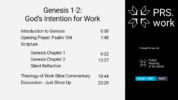
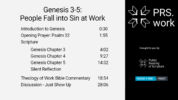
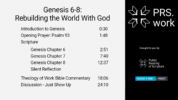


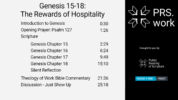


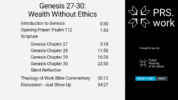
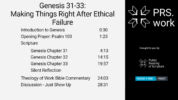




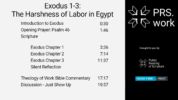



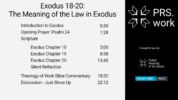


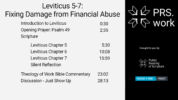







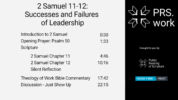





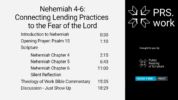


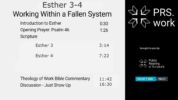
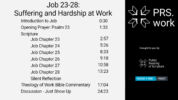


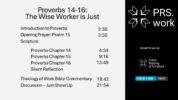


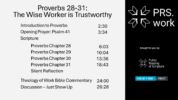



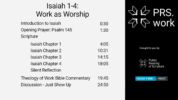
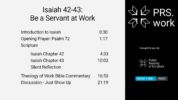

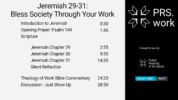
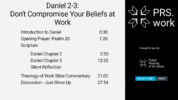

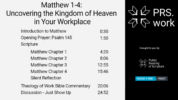


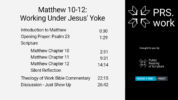


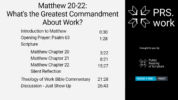



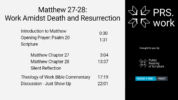




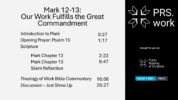
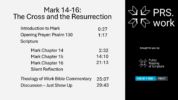

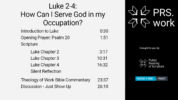





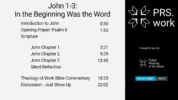

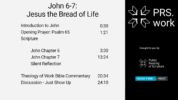


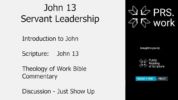
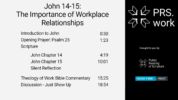


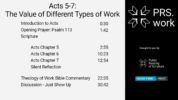

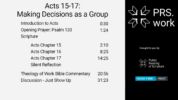
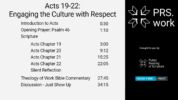
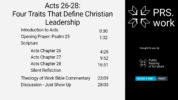
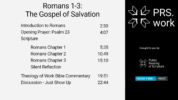
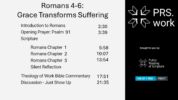
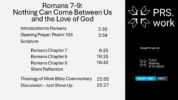
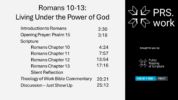

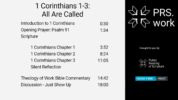

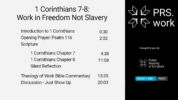


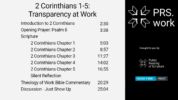
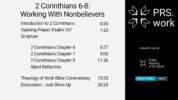

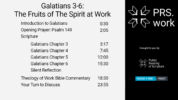

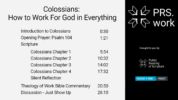
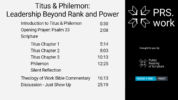
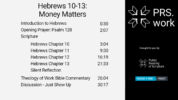
.jpg)
